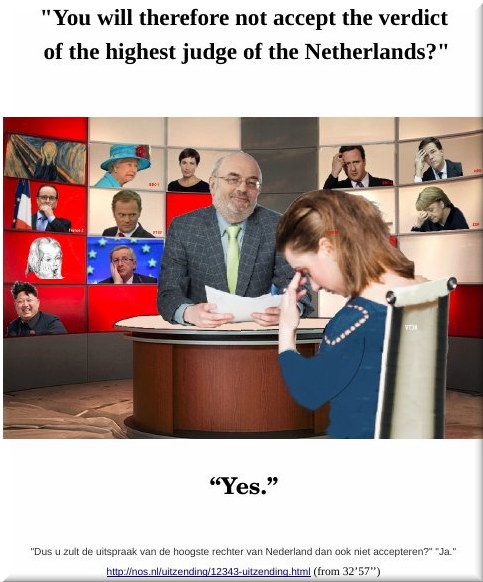

THE EPO's management is so extremely arrogant that it perceives itself as above the law, immune from courts (even at The Hague which is famous for some of its courts), and totally unaccountable. If Eponia was a real nation, it would probably be something like North Korea, where reporting is frowned upon and unhappiness (in public) is barely an option. Dissent is a heinous crime and the Internet is blocked from inside the country 'for protection' (like the EPO blocking Techrights).
"Dissent is a heinous crime and the Internet is blocked from inside the country 'for protection' (like the EPO blocking Techrights)."Willy Minnoye, speaking on behalf of the EPO's top-level management, said he would ignore the ruling from the highest Dutch court if it ruled in favour of SUEPO, the Staff Union of the EPO. To say so publicly on Dutch television is to basically insult the citizens of the Netherlands, a host country of the EPO (Minnoye is not Dutch by the way).
"Severe defeat for SUEPO, Union and Labour rights, Human rights in The Netherlands" was reported to us this afternoon after "SUEPO [had] lost the case in cassation!" [sic]
Here is the report about it (in Dutch). Stay tuned as we shall update this article with a manual translation very shortly. ⬆
Update: Petra Kramer has produced for us a translation of the aforementioned article and as far as we are aware, it's the first English translation of the news (with our highlights added):
AG: Dutch judge unauthorized in dispute between European Patent Office and unions
The European Patent Office (EPO) was right to claim immunity from jurisdiction in a dispute. That means that the international organization can not be brought before the Dutch courts in disputes about the official activities of the organization. The Dutch court has no jurisdiction to adjudicate in a dispute between the Rijswijk-based European Patent Office, a unit of EPO, and the trade union association of the European Patent Office and the umbrella union for employees of EPO. Advocate General Vlas wrote today in his opinion, an advice to the Supreme Court.
A conflict arose between the EPO and the union union of EPO (VEOB) and the umbrella union for employees of EPO (SUEPO). The reason for this conflict are, among others new lines crossed in the service rules of the European Patent Office. VEOB and SUEPO find that the rules restrict the right to strike too much and that EPO should recognize them as social partners in collective negotiating. This case concerns the question whether the granting EPO immunity constitutes an impermissible restriction on the right of access to justice within the meaning of the European Convention on Human Rights.
A preliminary injunction judge dismissed EPO's claim on immunity but rejected the claims of VEOB and SUEPO - the withdrawal of the strike rules and recognition as social partners. According to the court VEOB and SUEPO can address their demands to the central organization. On appeal the court also ruled that EPO can not rely on immunity. The court upheld the claims of the unions. Against this judgment the EPO brought an appeal in cassation. The State supports the position of EPO as intervener. According to the Minister of Justice, the State need to abide by agreements on immunity of international organizations.
Advocate General Vlas states that the right of access to justice in accordance with the European Convention on Human Rights is not absolute. According to Vlas, VEOB and SUEPO's rights must be sufficiently guaranteed by the EPO in existing internal dispute procedure with an appeal of individual employees and employee representatives at the Labour Tribunal of the International Labour Organisation in Geneva. The core of the right of access to justice guaranteed by the European Convention on Human Rights is therefore not affected, says Vlas.
A conclusion is an independent, non-binding, legal opinion to the Supreme Court. The Advocate General is a member of the Public Prosecutor at the Supreme Court. The prosecutor at the Supreme Court is an autonomous, independent part of the judicial system. It does not belong to the Public Prosecutor.
It is expected that the Supreme Court will deliver its verdict on 20th January 2017.
Comments
One of those...
2016-09-30 20:08:09
flintstone
2016-10-04 11:09:29
Dr. Roy Schestowitz
2016-10-04 11:52:23
flintstone
2016-10-04 12:12:24
Dr. Roy Schestowitz
2016-10-04 12:19:31
There are still some articles I wish we had translations of so that I can properly respond to them (some DE, some IT, now one in FR).
Can anyone do this one for us?
http://business.lesechos.fr/directions-juridiques/droit-des-affaires/brevets-et-marques/le-paquet-brevet-suspendu-au-brexit-300551.php#